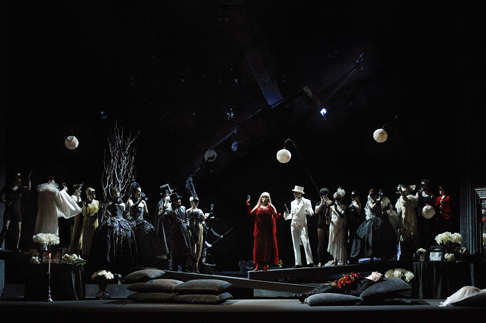The author was an “enfant
prodige” when at the age of 23 , and with already two successful operas
on his back, Die tote Stadt ( “The Dead City”) had the
privilege of simultaneous premiËres in Hamburg and Cologne. It had been turned
down by Vienna mainly because of a rift between Gustav Mahler (then, at the
helm of the Staatsoper) and Korngold’s father, Julius, a well known (and
very strong minded) music reviewer as well as co-author (with his son) of the
terse libretto. The success was enormous. Also in Vienna, where it was staged a
few months later.
Even before the first staging, Giacomo Puccini was so shocked by a piano
performance by “young Erich Wolfgang” that, according to hearsay
in many of his biographies, stopped composing the final part of
Turandot. In the 1920s, Die tote Stadt was applauded in all
main European opera houses. At the advent of Nazism, Korngold emigrated to the
U.S. where he spent most of his life between New York and Los Angeles. He
became a well known author of film music, winning no less than two Oscar
Prizes.
After a long period of silence, Die tote Stadt found a new lease on
life in the mid-1970s, with successful and almost parallel, albeit very
different productions, in New York (at the City Opera) and in Munich. I loved
the City Opera production when I was living in Washington; the music drama was
being toured in the USA. It appeared quite frequently until the mid-1980s. Then
a new phase of relative oblivion; it re-emerged in the late 1990 at the Spoleto
Festival and in 2004 at the Salzburg Festival. The Salzburg production, staged
by Willy Decker, had standing ovation; since then, it is in the repertory of
the Vienna Staatsoper and has been seen in Barcelona, Madrid and several other
major theaters; last February was in London at the RHO. In Italy, Die tote
Stadt had his premËre in Catania in 1996, was in Spoleto in 1998 and is
now in Venice and Palermo in a new sparkling production — quite different from
Decker’s.
The plot is base on a decadent late 19th century novel by the symbolistic
writer and poet Georges Rodendach — also the basis, as a play, for a
major box-office hit It revolves around the obsessions of young widower, Paul;
madly in love for his past wife Marie. He thinks that she revives in a sexy
dancer, Mariette, visiting Bruges (“the dead city”) to perform in
the local opera house. To come to grip with his obsessive day-dreams, Paul has
to kill Mariette and leave Bruges forever. The score includes a broad
cross-section of all what was in vogue in Central Europe in the years around
the First World War. It has reminisces from Wagner and Strauss but especially
the opulence of Schreker. The listener can feel that Zemlisky was
Korngold’s teacher, not only Schˆnberg. The complex vocal and orchestral
score leaves also room to two set pieces — Mariette’s Lute Song and
Pierrot’s Dance Song — easy to listen and frequently requested in
German radio programs.
 A scene from Die tote Stadt [Photo by Michele Crosera]
A scene from Die tote Stadt [Photo by Michele Crosera]
The Palermo and Venice joint productions — two of the rare financially
sound Italian opera houses — features a fascinating staging by Pier Luigi
Pizzi. With a skillful use of mirrors and lighting, we are enthralled in a
deadly atmosphere: Paul’s house opens on a decaying city in a dark swamp
of stagnant water. The details are carefully described in James Sohre’s
review of the Venice production published in Opera Today on 8 March. In Palermo, though, there is a different cast. The conductor Will Humburg
digs into the score to show its modern approach as well the
“virtuoso” efforts requested to some orchestra soloist. Very taxing
the role of the protagonist, Paul, always on stage with a heldentenor pitch;
John Trelaven is up to the required standard; in my opinion, a better fit than
Stefan Vinke in Venice . Nicole Beller Carbone is an erotic Mariette, both
vocally and dramatically. Good all the others.
The Palermo audience is gradually getting adjusted to more innovative opera
seasons than those of the past and applauded warmly the April 16th opening
night of Die tote Stadt in their beloved Teatro Massimo.
Giuseppe Pennisi
image=http://www.operatoday.com/1292zm_7265Die_tote_Stadt.gif
image_description=A scene from Die tote Stadt, Palermo [Photo by Michele Crosera]
product=yes
product_title=Erich Wolfgang Korngold: Die tote Stadt
product_by=Paul: John Treleaven; Marietta / Marie: Nicola Beller Carbone; Frank: Christopher Robertson; Brigitte: Tiziana Tramonti; Juliette: Mina Yamazaki; Lucienne: Julia Oesch; Fritz: Franco Pomponi; Counte Albert: Federico Lepre. Orchestra, Coro e Coro di voci bianche del Teatro Massimo. Will Humburg, Pierluigi Pizzi, director.
product_id=Above: A scene from Die tote Stadt, Palermo [Photo by Michele Crosera]